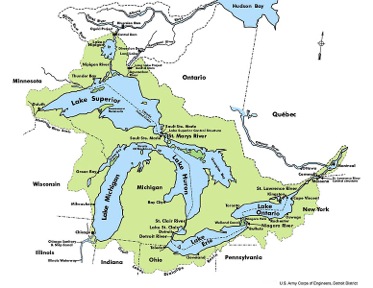Minnesota Puts Hold on Waukesha Water Diversion Request
- Share
- Tweet
- Pin
- Share

A decision on the City of Waukesha’s application to divert Great Lakes water was put on hold for a week on May 11 when Minnesota representative Julie Ekman asked for more time to discuss recent changes to the application with Minnesota officials.
“They were supposed to come to a decision,” said Ezra Meyer of Clean Wisconsin. Meyer has attended all four of the meetings the regional representatives have held in Chicago going back to April 21-22. “A little bit after they got started, just before shifting over to voting mode, Minnesota said, ‘Hold the presses. We’re not ready. We need some more discussion in Minnesota to look at the substantive conditions and tweaks they’ve made.’”
Meyer said the one-week request was granted and the representatives of the eight Great Lakes states and two Canadian provinces will hold a telephone conference on May 18 to vote on the application.
Thirty days after that, the Compact Council, comprised of the eight governors of the Great Lakes states, will meet to make a final determination on Waukesha’s proposed $207 million water diversion project.
“We don’t know what it means,” Meyer said of the delay. “We don’t really know how the governors stand. In some ways it’s assumed to be on display here at this meeting, but the governors aren’t there. What happens with this group could be different from what happens with the Compact Council.”
Meyer said Michigan joined Minnesota in saying there are some unresolved issues that came up in the previous meetings that have to be discussed internally with state officials. One of those issues, he said, is the return of the treated water to Lake Michigan via the Root River, which is already on the DNR’s impaired waters list for high phosphorus levels and other contaminants.
Meyer said Clean Wisconsin sent a letter on May 9 to all the members of the regional body, outlining concerns for the plan and reiterating its support for an alternative to diverting millions of gallons of water from Lake Michigan daily.
“The fundamentals haven’t changed. We still believe there is a reasonable water supply alternative for Waukesha that can work, especially in light of fact the regional body has agreed with us that the dramatic expansion to the water supply service area doesn’t pass muster and can’t be in play any more.”
The original application called for the diversion of 10.1 million gallons daily to a service area beyond Waukesha’s boundaries. The regional body eliminated everything from the plan but the City of Waukesha, but that still means withdrawing 8.2 million gallons of Lake Michigan water daily.
“The fundamentals haven’t changed,” Meyer said. “We still believe there is a reasonable water supply alternative for Waukesha that can work, especially in light of the fact the regional body has agreed with us that the dramatic expansion to the water supply service area doesn’t pass muster and can’t be in play any more.”
The alternative plan calls for updating technology at Waukesha’s water treatment plant to remove radium from the water supply and dispose of the radium in an environmentally friendly way.
“It seems a couple of folks don’t see it that way,” Meyer said. “They think it’s better to leave radium in the ground and not bring it up, even if it’s going to be treated and you can avoid the human health impact.”
The governors will meet in Chicago some time in June to vote on the water diversion request. The two Canadian provinces are not included in this final meeting. Unanimous approval is needed for the project to proceed.
